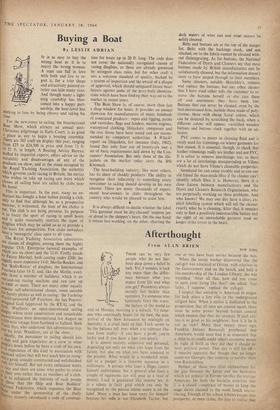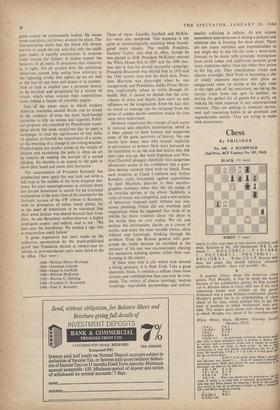Afterthought
From ALAN BRIEN
THERE can be very few people who do not liar- hour deep down a belief in luck. Yet, I wonder, is luck any more than the differ- ence between what you expect from life and what you get? PessiMists always secretly feel luckier than optimists. To someone who habitually fears the worst,
the failure of the world to cnd on Monday morning is a miracle, To some- one who continually hopes for the best, the non- arrival of the New Jerusalem by midnight on. Saturday is a cruel twist of fate. luck seems to be the balance left over when you subtract illu- sion from reality--if you have a profit youate lucky and if you have a loss you aren't.
It is almost entirely subjective and personal, depending not only on what you hope from the future, but also on what you have amassed in the present. What would be a wonderful wind- fall to a pauper is a tiresome nuisance to a millionaire. A private who loses a finger counts himself unfortunate, but a general who loses a couple of regiments can still pose as a man of destiny. Luck is graduated like income tax. It is a rebate in fairy gold which can only be recognised by the person whose name is on the label. Many a man has been sorry for himself because his wife is not Elizabeth Taylor. but one or two have been sorrier because she was.
When the social worker discovered that the call-girl was educated at Girton, with relatives in the Government and on the bench, and held a life-membership of the London Library, she was mystified. 'After all that, how did you come to earn your living like this?' she asked. 'Just lucky, I suppose,' replied the call-girl. I suspect that anecdote is American in origin. for luck plays a key role in the underground religion here. When a nation is dedicated to the proposition that all men are created equal, there must be some power beyond human control which ensures that they die unequal. If each citi- zen is as good as his neighbour, how is it he is not as rich? More than twenty years ago, Franklin • Delano Roosevelt prophesied that Americans would soon find it as unnatural 'that a child in its cradle could inherit economic power by right of birth as they did that it should in- herit political power. That day is still far off— it remains apparent that though they no longer count our Georges, they continue to number their own Rockefellers.
Neither of those. two rival explanations for the gap between the haves and the have-nots which arc popular in Europe satisfies the average American. He finds the Socialist. assertion that it is a closed conspiracy of bosses to keep the wage slaves chained to the work bench uncon- vincing. Enough of his school fellows escape into prosperity, or even riches, for him to realise that
gates cannot be permanently locked. He wants more capitalists, not fewer, around the place. The free-enterprise claim that the fittest will always survive to reach the top, and that only the misfit goes under, is equally unattractive. It removes every excuse for failure. It makes money the measure of all merit. It proclaims that whatever is, is right. Yet all around him, the ambitious American cannot help seeing how arbitrary is the lightning stroke that opens up an oil well at the feet of one man and denies it to another. And so luck is exalted into a personal demon to be invoked and propitiated by a variety of rituals which often conceal their superstitious roots behind a facade of scientific jargon.
One of the many ways in which modern America resembles ancient Rome can be found in the tendency of even the most hard-headed careerists to rely on omens and auguries. Politi- cal prophets are consulted by Presidential candi- dates about the most auspicious day to open a 'campaign, to read the significance of tiny shifts of opinion, to foretell the importance of a name, or the meaning of a change in the voting weather. Psephologists are secular priests in the temple of chance and examining the polls is often an art as esoteric as reading the entrails of a sacred chicken. An election is an appeal to the gods to show their hand and name their favourite.
The assassination of President Kennedy has emphasised once again the way luck can write a full stop in the middle of the most eloquent sen- tence. Its utter meaninglessness in rational terms has forced Americans to search for an irrational explanation in the stars. One of the reasons for the fantastic success of the TW tribute to Kennedy, with its procession of rather banal pieties, lay in the need of Americans to be reassured that their awed dismay was shared beyond their fron- tiers. As one Broadway author-director, a highly intelligent sceptic and radical, said to me: 'We had seen the crucifixion. We needed a sign that a resurrection could follow.'
A great impression has been made on the collective unconscious by the much-publicised proof that Presidents elected at twenty-year in- tervals in zero-numbered years seem fated to die in office. They were: 1840—William Henry Harrison 1860—Abraham Lincoln 1880—James A. Garfield 1900—William McKinley 1920--Warren G. Harding 1940—Franklin D. Roosevelt 1960—John F. Kennedy Three of these—Lincoln, Garfield and McKin- ley—were also murcjered. This sequence is not quite so numerologically numbing when investi- gated more closely. The twelfth President, Zachary Taylor, also died in office, though he was elected in 1848. President McKinley entered the White House first in 1897 and the 1900 elec- tion was in fact his second successful campaign. President Roosevelt was elected first in 1932 and the 1940 victory won him his third term. Presi- dent Harrison was sixty-eight when he was inaugurated, and Presidents, unlike Prime Minis- ters, traditionally refuse to retire through ill- health. Still, it cannot be denied that the coin- cidence of dates and deaths does exert an odd influence on the imagination. Even the fact that no moral or message can be extracted from the series of sudden deaths somehow makes the jinx seem more malevolent.
However impervious the concept of luck seems to rational and objective examination, belief in it does appear to have buoyed and supported some of the great survivors of history. No one knows how many men who trusted implicitly in providence to protect them were betrayed on the battlefield or on the sick-bed before they felt their time was up. But both Napoleon and Win- ston Churchill plunged cheerfully into dangerous adventures secure in the confidence that a guar- dian destiny covered them with its shield. Even such moderns as Claud Cockburn and Arthur Koestler, early inoculated against superstition by their Marxism, describe in their autobio- graphies moments when they felt the nudge of an invisible adviser at the elbow. Suddenly, a cycle of events was completed, and a new pattern of behaviour imposed itself, without any con- scious planning. Freud did not overlook such experiences when he suggested that most of us imbibe far more evidence about our place in the world than we ever realise. We sift and analyse the information, decide on a course of action, and make the most sensible choice, often without ever knowingly thinking through the problem. Even the 'Zeman general who post- poned the battle because he stumbled at the entrance of his tent was unconsciously obeying his instinctive warning system rather than con- forming to the omens.
If there were ever a city where luck seemed a living presence, it is New York. Like a giant electronic brain, it contains a million times more circuits and combinations than can ever be com- puted. The variety of chance meetings, random couplings, improbable partnerships and unfore-
seeable collisions is infinite. At any minute somewhere here someone is hitting a jackpot and someone else is drawing the short straw. There are too many variables and imponderables in any single day in any life for even a short-term forecast to be made with certainty. Immigrants from small towns and traditional societies grow more credulous rather than less when they arrive in the big city. They manufacture rituals and charms overnight. New York is becoming a city of mildly obsessive neurotics who place an exaggerated value on sitting at the right table in the right side of the restaurant, on taking the correct route from one spot to another, on having the perfect list of guests for a party, on making the ideal response to any conversational overture. They are seeking to construct perma- nent and reassuring habits in an atomised and unpredictable society. They are trying to make luck unnecessary.



































 Previous page
Previous page